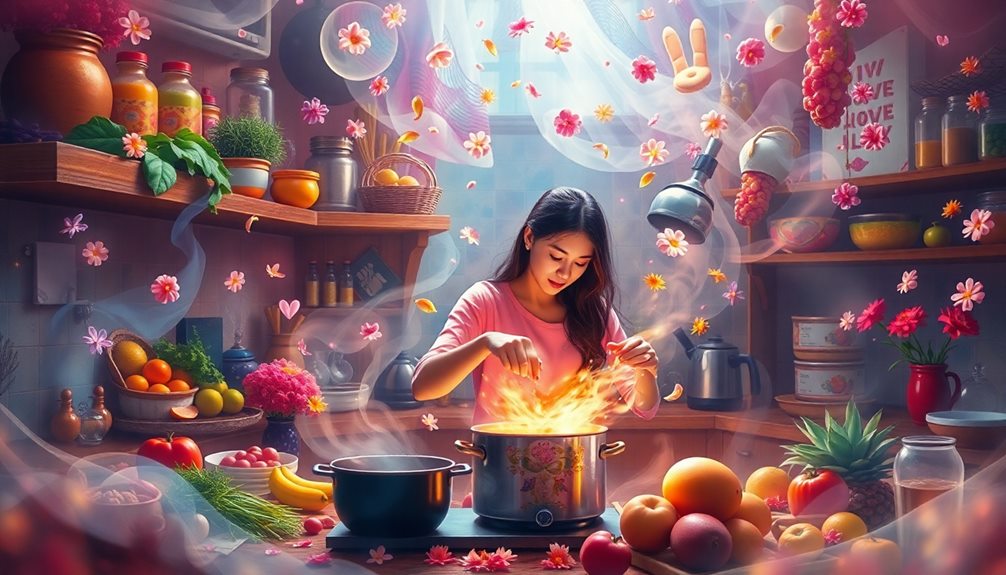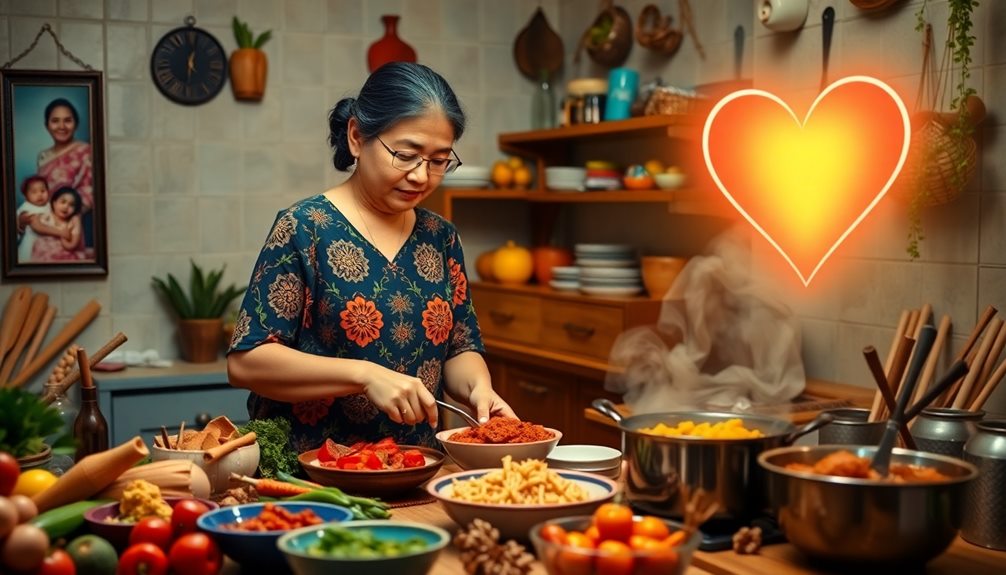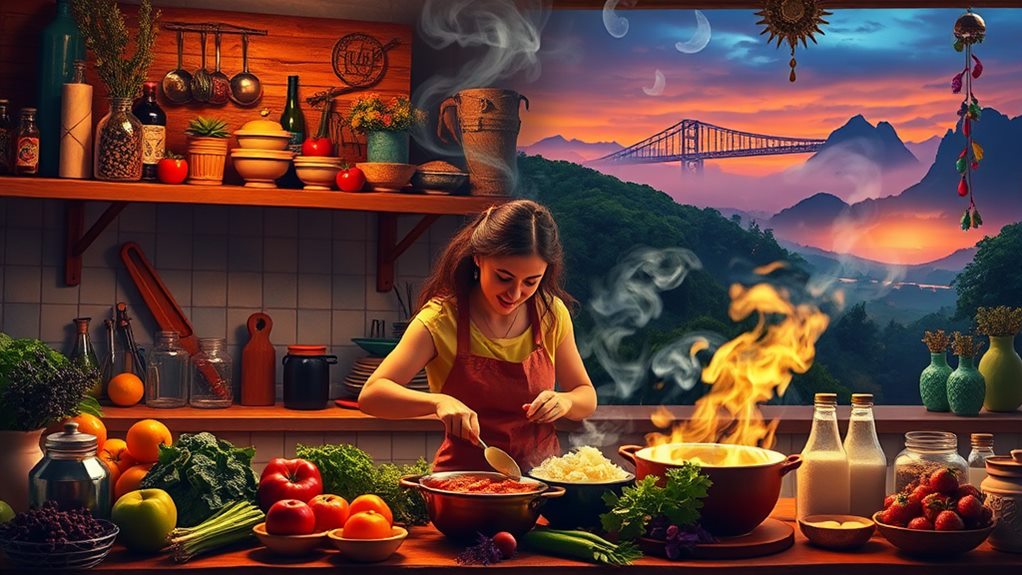"Like Water for Chocolate" tells Tita's enchanting tale, where food and emotions intertwine vividly. As the youngest daughter in a strict family, Tita fights against traditions that bind her. Her love for Pedro complicates her life, especially with her sister Rosaura in the mix. Each chapter features recipes that express Tita's feelings and bring magical experiences to life, showcasing how food serves as both a form of rebellion and connection. This story highlights love's transformative power and the challenges of societal norms. Enjoy the journey as you uncover more layers of this enthralling love story.
Overview of the Story
In *Like Water for Chocolate*, you're introduced to Tita, the youngest daughter of the De La Garza family, who faces the harsh constraints of family tradition. Bound to care for her mother, Mama Elena, Tita's heart aches for Pedro, the man she loves.
However, the situation becomes complicated when Pedro marries her sister, Rosaura, to stay close to Tita. This creates a love triangle filled with emotional turmoil that drives the narrative forward. Tita's journey symbolizes female empowerment and self-expression, as she navigates the challenges imposed by a patriarchal society.
The novel unfolds in monthly installments, each beginning with a recipe that reflects Tita's feelings and the events in her life. Through cooking, Tita expresses her emotions, channeling her passion and pain into her dishes, leading to magical experiences that resonate with those who partake in her culinary creations.
This is where magical realism comes into play; the food she prepares has the power to affect those who eat it, often leading to unexpected and profound experiences. As you explore Tita's journey, you'll witness how her love transcends the limitations imposed by her family.
The interplay of culinary art and emotion adds depth to her character, making her story a rich tapestry of love, longing, and the struggle against tradition, as seen in the symbolism of food and emotions.
Themes of Love and Emotion
Through the lens of *Like Water for Chocolate*, love emerges as a powerful and transformative force that defies societal norms and familial expectations. Tita's passionate connection with Pedro illustrates the complexities of a love triangle, where her feelings challenge the constraints imposed by her family.
Tita's emotions are intricately woven into her cooking, infusing each dish with her longing and desires, creating a magical realism that affects everyone who partakes.
- The impact of forbidden love and its consequences
- Maternal love as a driving force in Tita's life
- The resilience and complexity of emotional bonds
- The joy and connection that true love can foster
- The transformative power of food as an emotional outlet
As you explore these themes, you'll see how Tita's unwavering affection leads to internal conflicts, highlighting the struggle between personal desires and societal obligations.
Ultimately, the narrative emphasizes that pursuing authentic emotional bonds, despite barriers, is essential for true joy and fulfillment. Tita's journey reveals that love, in all its forms, isn't only magical but also essential to the human experience.
Magical Realism in the Narrative

*Like Water for Chocolate* immerses you in a world where magical realism blurs the lines between the mundane and the extraordinary. This narrative technique allows Tita's emotions to manifest through the dishes she prepares, creating an enchanting connection between the food and the feelings of those who consume it.
As you investigate the complexities of Tita's journey, you can draw parallels to the resilience and strength demonstrated by women in impactful stories of survival, who confront adversities with courage. You witness surreal occurrences, such as chickens caught in tornadoes and spontaneous combustion ignited by passionate emotions, showcasing how heightened feelings can reshape reality.
Tita's birth itself embodies magical realism; her tears transform into salt, symbolizing her deep connection to the culinary world. This element underscores how her emotions intertwine with her identity and her role within her family.
The seamless incorporation of enchanting moments, like ghostly conversations and food imbued with magic, heightens the lyrical quality of the prose.
As you explore deeper, you realize that this magical realism intensifies the themes of love and desire, allowing you to experience Tita's internal struggles and societal constraints in a more vivid and imaginative manner.
The result is a rich, engaging narrative that celebrates love, tradition, and the extraordinary aspects of everyday life.
Character Analysis and Dynamics
At the heart of *Like Water for Chocolate* lies a profound exploration of character dynamics that illuminate the struggles of love, duty, and societal expectations. Tita, the protagonist, grapples with her intense love for Pedro, which is suffocated by her mother's oppressive traditions.
As you probe into the characters, you'll see how their interactions create a rich tapestry of emotions. This theme of resilience amidst adversity echoes the challenges faced by characters like Liesel Meminger in Nazi Germany's oppressive environment, where personal desires clash with societal constraints.
- Tita embodies the conflict between personal desires and familial obligations.
- Pedro's indecisiveness leads him to marry Rosaura, complicating the love triangle.
- Rosaura represents societal constraints, often acting out of jealousy towards Tita.
- Gertrudis, Tita's sister, symbolizes sexual liberation and challenges tradition.
- Supporting characters like Mama Elena and Nacha provide contrasting views on nurturing and tradition.
These character dynamics shape the narrative, revealing how Tita's yearning for love is consistently thwarted by the decisions of those around her.
Pedro's choice to marry Rosaura, rather than pursue Tita openly, adds layers of emotional turmoil. Meanwhile, Rosaura's jealousy and adherence to societal expectations only deepen the conflict, making the characters' relationships intricate and compelling.
The Role of Food and Cooking

In *Like Water for Chocolate*, food isn't just about nourishment; it's a powerful way for Tita to express her emotions. Each dish she prepares tells a story, weaving her feelings into the fabric of the narrative and impacting those who taste her creations.
This connection between food and emotion mirrors the principles of personal growth and resilience, showcasing how culinary art can serve as a medium for self-discovery and empowerment.
As you explore the role of food in the novel, you'll see how recipes become essential tools for understanding character dynamics and emotional depth.
Culinary Expressions of Emotion
Food serves as a powerful emotional conduit in *Like Water for Chocolate*, where Tita channels her feelings through the dishes she prepares. Each meal she cooks mirrors her emotional state, creating deep connections with those who consume her food. For Tita, cooking becomes an act of rebellion against familial expectations, allowing her to express her passions and frustrations.
- Cooking transforms emotions into tangible experiences.
- Dishes symbolize Tita's journey through love and heartache.
- Failed recipes reveal the limitations of food in filling emotional voids.
- Food serves as a bridge between generations, imparting wisdom.
- Culinary creations evoke powerful responses in others, shaping their feelings.
Through her culinary artistry, Tita conveys her longing and desires, demonstrating that food is more than sustenance; it's a means of connection.
The act of sharing food fosters relationships, allowing her to express love and wisdom to her daughter, Esperanza.
Ultimately, Tita's cooking encapsulates her inner turmoil, revealing the intricate relationship between cooking, emotions, and love.
In this magical narrative, food isn't just a backdrop but a vivid expression of Tita's heart and soul.
Recipes as Narrative Tools
Tita's culinary creations serve as more than just meals; they're integral narrative tools that enrich her story. Each chapter features a recipe that mirrors her emotional journey, linking food preparation to the events of her life. As you read, you'll notice how Tita infuses her feelings into her dishes. For instance, the Christmas Roll she prepares evokes deep sorrow, affecting everyone who tastes it.
These recipes reflect traditional Mexican cuisine, grounding Tita's struggles against her family's oppressive traditions in rich cultural significance. Food becomes a symbol of love and connection, illustrating how Tita's cooking nurtures relationships. By teaching her niece Esperanza the secrets of cooking, she passes down the wisdom of expressing emotions through culinary art.
Every meal shared emphasizes the complex nature of human emotions, showcasing how food conveys love, longing, and heartache. Tita's recipes aren't merely instructions; they act as emotional narratives, allowing you to experience her trials and triumphs.
Through her cooking, Tita transforms ingredients into stories, revealing how deeply intertwined love and food can be. In this way, the act of cooking becomes an essential part of her narrative, highlighting its emotional depth and cultural roots.
Forbidden Love and Its Consequences
Forbidden love in "Like Water for Chocolate" weaves a complex tapestry of passion, societal constraints, and heartache. Tita's deep emotional connection with Pedro flourishes despite the oppressive rules enforced by Mama Elena, reminiscent of the struggles faced by characters like Francie Nolan in immigrant experiences.
Their bond, however, becomes a source of suffering when Pedro marries Tita's sister, Rosaura. This choice complicates Tita's feelings and highlights the painful consequences of pursuing true love in a patriarchal society.
As you explore Tita's journey, consider these key elements:
- The emotional turmoil stemming from Tita's forbidden love for Pedro.
- The conflict between Tita's desire for security with Dr. John Brown and her passion for Pedro.
- Rosaura's jealousy, underscoring the tension between personal desires and familial expectations.
- The moral dilemmas Tita faces as she navigates her feelings amidst societal pressures.
- The profound personal growth and emotional fulfillment Tita experiences despite her suffering.
Ultimately, Tita's story reveals that pursuing true love can lead to heartache, yet it also becomes a transformative force, shaping her identity and resilience in a world that seeks to confine her.
Maternal Bonds and Family Expectations

In a world where love clashes with duty, the complexities of maternal bonds take center stage in *Like Water for Chocolate*. Tita's struggle highlights how family expectations can overshadow personal desires, echoing themes of shared grief and support that resonate with many familial relationships.
Bound by tradition, she's expected to care for her authoritarian mother, Mama Elena, rather than pursue her true love. This obligation creates a stifling environment, leaving Tita's emotional needs unfulfilled and her spirit crushed.
Mama Elena's strict adherence to family customs oppresses Tita, complicating their bond. While maternal love can be nurturing, it also becomes a tool of control, forcing Tita into a life devoid of happiness.
The kitchen becomes her sanctuary, where her relationship with food allows her to express the feelings she can't share. Each dish she prepares reflects her suppressed emotions and longing for connection, showcasing the depth of her maternal instincts.
Ultimately, Tita's journey reveals the struggle to reconcile familial obligations with personal desires. Her quest for true love illustrates how deeply maternal bonds can shape one's identity, compelling you to reflect on how family expectations can impact your own pursuit of happiness.
Humor and Cultural Commentary
Amidst the intense emotions and family drama in *Like Water for Chocolate*, humor plays an essential role in softening the narrative's weight. By incorporating exaggerated character traits and absurd situations, the novel provides comedic relief while tackling serious themes like love and family duty. This humor not only entertains but also serves as a lens through which you can explore deeper cultural significance and family dynamics, much like how the symbolism of the secret garden enhances character journeys in *The Secret Garden*.
- Rosaura's digestive issues offer a humorous critique of societal expectations.
- Mama Elena's oppressive control over Tita highlights the absurdities of traditional gender roles.
- Comical interludes contrast with emotional turmoil, enhancing reader engagement.
- The juxtaposition of humor and poignant moments critiques romantic relationships.
- Food becomes a source of joy and conflict, reflecting the complexities of love.
Esquivel expertly uses humor to emphasize the ridiculousness of adhering strictly to familial obligations at the expense of personal happiness. This playful tone invites you to reflect on the cultural significance of food and relationships, making the narrative both relatable and thought-provoking.
Through laughter, you connect with the characters and their struggles, making the story resonate on multiple levels.
Reader Reactions and Interpretations

When you read *Like Water for Chocolate*, you might find yourself laughing at the humor while also feeling deeply connected to Tita's struggles.
The dynamics of love and duty explored in the narrative resonate with the complexities of marriage, such as the intersection of love and duty that challenge traditional views.
The ending can leave you pondering—do you see it as magical or bittersweet?
Your interpretation of the story's themes of love and duty can shape your entire experience, highlighting its rich cultural reflections.
Emotional Resonance With Readers
Readers' emotional connections to *Like Water for Chocolate* stem from its vivid storytelling and relatable themes. You might find yourself captivated by Tita's struggles with love and family duty, reflecting your own emotional turmoil. The novel's engaging narrative and rich sensory descriptions evoke strong feelings, making it compulsively readable.
Consider these aspects that deepen your connection to the story:
- Tita's Journey: Her quest for love amidst familial obligations resonates with many.
- Food as Emotion: The powerful role of food in expressing feelings brings a unique perspective to relationships.
- Humor and Heart: The balance of humorous moments with serious themes allows for a connection that feels both light-hearted and profound.
- Culinary Art: The intersection of love and cooking creates a sensory experience that you can almost taste.
- Rereading Experience: While some may feel the emotional impact diminishes upon rereading, Tita's journey still resonates on various levels.
Ultimately, *Like Water for Chocolate* taps into universal themes, making it a timeless story that continues to evoke strong emotional responses in its readers.
Varied Interpretations of Ending
The ending of *Like Water for Chocolate* sparks a lively debate among fans, as its transformative fire symbolizes the peak of Tita and Pedro's love while inviting varied interpretations.
For some readers, this ending is a tragic yet beautiful resolution, showcasing how love can endure even beyond death. They see Tita and Pedro's emotional reunion in the afterlife as a hopeful conclusion, representing eternal love that transcends physical existence.
On the other hand, some find the ending overly fantastical or even sad, questioning whether such a transformative love can truly exist. This blend of magical realism and emotional depth prompts a spectrum of reactions, reflecting the complexity of human emotions.
You might find yourself pondering whether the ending provides closure or leaves lingering questions about fate and destiny.
Ultimately, these varied interpretations reflect broader themes of love and sacrifice, resonating differently with each reader. Your perspective shifts as you engage with the text, allowing you to explore the depths of Tita and Pedro's love, transformed through tragedy and hope.
Whether you find solace or confusion in the ending, it undeniably sparks a conversation about the nature of love itself.
Humor and Cultural Reflection
Humor plays an essential role in *Like Water for Chocolate*, weaving through the narrative to reflect cultural norms and challenge societal expectations. The novel's blend of comedic moments, like Rosaura's digestive woes, contrasts sharply with its more serious themes, enriching the story and enhancing its emotional complexity. As you read, you'll likely find yourself laughing while simultaneously grappling with deeper issues of love, duty, and tradition.
Consider these aspects of humor and cultural reflection in the novel:
- It critiques traditional gender roles through satirical character portrayals.
- Comedic situations highlight the absurdity of familial obligations.
- Readers experience a range of emotional responses, showcasing the story's complexity.
- The fast-paced readability keeps you engaged and entertained.
- Varied interpretations of the ending reveal the subjective nature of humor.
Through its unique use of humor, Like Water for Chocolate not only entertains but also invites you to reflect on the societal expectations that shape relationships and personal identity. This duality allows for a rich reading experience, making it both memorable and thought-provoking.
Related Works and Recommendations
If you enjoyed *Like Water for Chocolate* for its rich blend of magical realism and emotional depth, you might want to explore other works that share similar themes. The exploration of love and meaningful connections in *The Little Prince* can evoke a similar emotional resonance, highlighting the significance of relationships in our lives the importance of intangible qualities.
*Chocolat* by Joanne Harris investigates love and the transformative nature of food, much like Esquivel's novel. Set in a quaint French village, it beautifully illustrates how chocolate can evoke desire and change lives.
You might also appreciate *Midnight's Children* by Salman Rushdie, which intertwines personal stories with national history through magical realism, echoing the emotional connections found in *Like Water for Chocolate*.
Another intriguing choice is *People of Paper* by Salvador Plascencia, where love and identity are examined through a unique blend of magical realism and metafiction, similar to Tita's journey.
For a protagonist challenging societal norms, consider *Even Cowgirls Get the Blues* by Tom Robbins. This novel resonates with Tita's struggles against familial obligations while infusing humor and adventure.
Conclusion
In "Like Water for Chocolate," you discover love that transcends boundaries, emotions that ignite passion, and food that nourishes the soul. You witness the struggle between desire and duty, the bond between mother and daughter, and the magic woven through everyday life. This enchanting tale invites you to savor each moment, embrace each flavor, and feel each heartbeat. So, plunge into this enthralling story, celebrate its richness, and let it inspire your own journey of love and longing.



